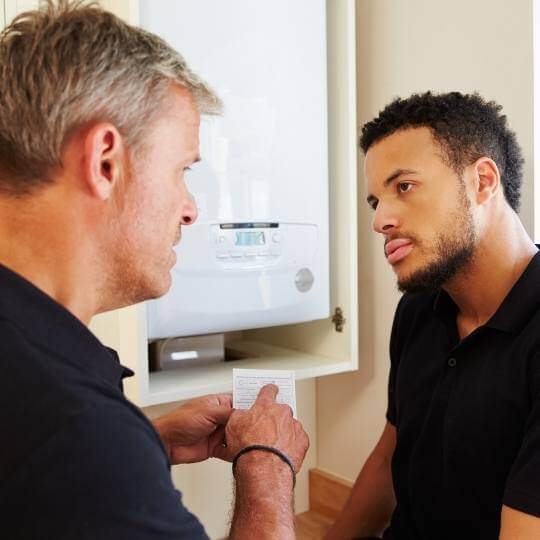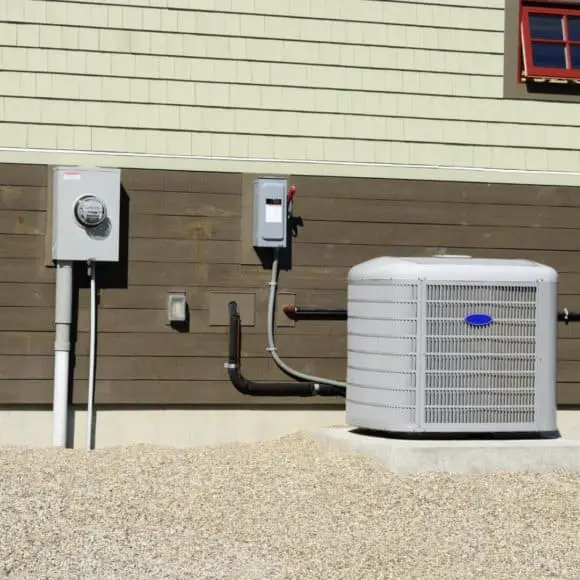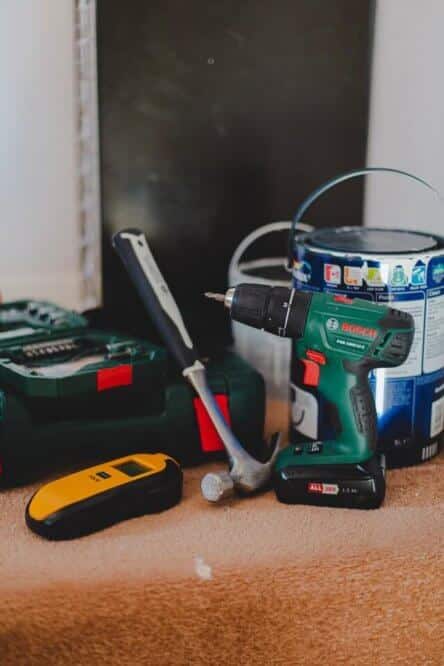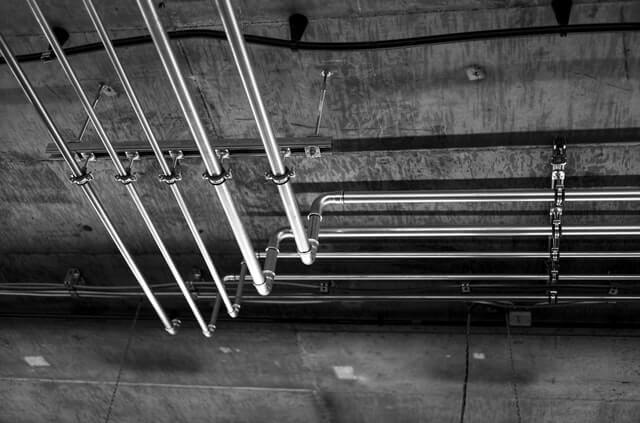Have you decided to do some DIY work at your house? Or are you considering a trade career? Under these circumstances, you might be interested in the difference between plumbing vs HVAC.
Both trades involve pipes, but the roles of plumbing and HVAC systems are considerably different.
Keep on reading to find out what each concept means and how they differ from each other.
What is Plumbing?

Plumbing refers to systems that convey fluids for a wide range of applications. A more restricted definition of plumbing is provided by Encyclopedia Britannica:
“System of pipes and fixtures installed in a building for the distribution and use of potable (drinkable) water and the removal of waterborne wastes”
This definition is to distinguish plumbing from water and sewage systems that serve a group of buildings or a city.
Plumbing plays a critical role in ensuring a comfortable and healthy life. Before the development of modern plumbing, consumption of contaminated water caused multiple outbreaks of typhoid fever and dysentery.
What is HVAC?

HVAC has also made a huge difference in improving the quality of life. HVAC stands for Heating, Ventilation, and Air Conditioning.
Aside from keeping you warm in the winter and cool during the summer, HVAC also ensures clean indoor air. A high level of indoor air quality is ensured by filtering it and maintaining humidity percentages at optimum levels.
What an HVAC system does is:
- Using a fresh air source located outside your home or business;
- Filtering air to trap particles and allergens;
- Heating or cooling air;
- Sending air in rooms.
HVAC is not the same thing as air conditioning. Air conditioning is a part of HVAC, and the latter can also include heat pumps and gas furnaces. HVAC also deals with heating, not just cooling.
What is HVAC system in a house? It is the entire system responsible for ensuring clean air at the right humidity level and temperature.
Main differences between plumbing and HVAC
Plumbing vs HVAC is an endless discussion as the two trades share some similarities. Yet, they are completely different as they address different systems in your home.
Knowing plumbing can enable you to get involved with HVAC and vice versa. Even if there is significant difference between plumbing and HVAC, there are technicians working in both fields.
However, best is to call to the services of specialized plumbers and HVAC technicians. Doing so will ensure the functionality and longevity of both your plumbing and HVAC systems.
In this section we will be presenting the main differences plumbing vs. HVAC. This will enable you among others to call the right expert, depending on the services you need provided.
Plumbing vs HVAC salary
Those interested in a trades career are definitely interested by the remuneration in both fields.
The average base salary of a plumber in the US is $25.28 per hour.
Additional compensation accounting for overtime can reach up to $6,750 per year.
Common benefits for plumbers include paid time off, relocation assistance, flexible schedule, life insurance, and parental leave among others.
Earnings are slightly lower for HVAC Technicians, who earn an average salary of $23.82 per hour.
Additional compensation can reach up to $6.562 per year, with similar benefits.
An HVAC Project Manager can earn an excellent salary of $75,22 per hour and enjoy great benefits. A Plumbing Engineer can earn even more, at $84.6 per hour.
In conclusion, both trades are highly lucrative, are in high demand, and present great career prospects. Acquiring experience and completing additional training in both fields are definitely worth the effort.
Projected job growth
Both trades have a similar expected job growth. The shortage of skilled plumbers is higher and visible at all training levels. This is because a large number of experienced plumbers are close to retirement.
The shortage is less severe for HVAC technicians in general. The problem here is the shortage of qualified workers that have computer and electronic skills. The multiple developments made to HVAC systems in the last years have only increased the demand.
Education requirements
Coursework for the two trades is different. Obtaining a HVAC certificate is preceded by training in:
- Heating
- Air conditioning
- Electrical concepts
- Duct systems
- Reading blueprints
- Soldering and welding
Getting a certificate in plumbing requires coursework in:
Water and air concepts
- Plumbing codes
- Installing and testing plumbing systems
- Installing and maintaining drain and waste systems.
What the two career paths have in common is that coursework for both trades is hands-on. You also need extensive practical training in order to be able to work as a plumber or a HVAC technician.
Learning to become a HVAC technician takes a little more time than becoming a plumber. This is because HVAC technicians need to know the fundamentals of both plumbing and electricity.
On-the-job training length for both trades is similar. You will need to spend approximately 8,000 hours of on-the-job training to get to journeyman status. This is anywhere between three and five years of apprenticeships, depending on how many hours you work each week.
Licensing requirements
Licensing requirements for plumbers and HVAC technicians vary from state to state. Most plumbers are required to have a license.
For HVAC technicians, licensing requirements are generally lower. Some states require all HVAC technicians to have a license. Others put this condition only if you plan to open your own business.
Job duties
Plumbers have the following responsibilities at work:
- Installing pipes;
Maintaining and repairing plumbing systems; - Designing pipe installations for construction projects;
- Installing and repairing fixtures such as sinks, toilets, bathtubs, and water heaters.
Plumbers are often found in business and residential settings. They can also be employed by construction companies to install new plumbing systems.
HVAC technicians are less likely to specialize and have a wider variety of duties:
- Maintaining a building’s HVAC systems;
- Diagnosing electrical and mechanical faults for HVAC systems;
- Performing warranty services;
- Keeping daily logs of maintenance functions;
- Ensuring compliance with industry standards.
- Demand for skills
The demand in skills for plumbers and HVAC technicians is quite different. For plumbers, the current focus is on low-water piping and fixtures. These are in high demand as building codes are getting stricter in order to reduce resource consumption.
Those working in the HVAC trade need excellent troubleshooting skills. HVAC systems are getting increasingly complex and technicians need to be able to solve a larger variety of problems.
Which is harder, plumbing or HVAC?

Those who research plumbing vs. HVAC are also interested in which is harder, plumbing or HVAC?
The answer to this Plumbing vs HVAC – What’s the Difference?question is not simple at all. Both industries are similar in terms of complexity, risks, and consumer demand. There are also varying degrees of skills and experience among technicians in each field.
Finding one trade more difficult than the other depends on your traits of personality. For instance, if you have aversion towards germs and bad odors, then you might hate being a plumber. If you are afraid of working with electricity, HVAC may seem like too much of a challenge. HVAC involves electrical knowledge and can be potentially dangerous.
Some tradesmen tend to prefer HVAC because it’s cleaner and easier on the body as you get older. The diversity of work in HVAC can also be a solid argument for choosing this trade.
A common misconception is that HVAC workers can also do plumbing, but this is not always true. There are some aspects of plumbing that only a qualified plumber can do.
All things considered; plumbing can be harder because it’s messier. Plumbing also deals with waste systems.
Being a plumber does not mean you finish the day very dirty, but this can happen sometimes. You can become pickier as you gain more experience to avoid the nasty side.
Bottomline
The two trades differ in terms of duties and work settings. The important thing to remember is that both are needed and in high demand.
Plumbing vs HVAC – which is harder?
HVAC tends to be easier due to the lack of licensing requirements in some states. The cleaner nature of the job also makes HVAC to look like a superior option. What you pick as a profession or a hobby depends on your skills and preferences.
You might be interested to know more about pipefitting vs plumbing.

Michael Davis is a heating & plumbing expert who currently works as independent contractor in SC. He also writes for Plumbertip.
For almost 10 years he worked on various plumbing tasks across South Carolina.


